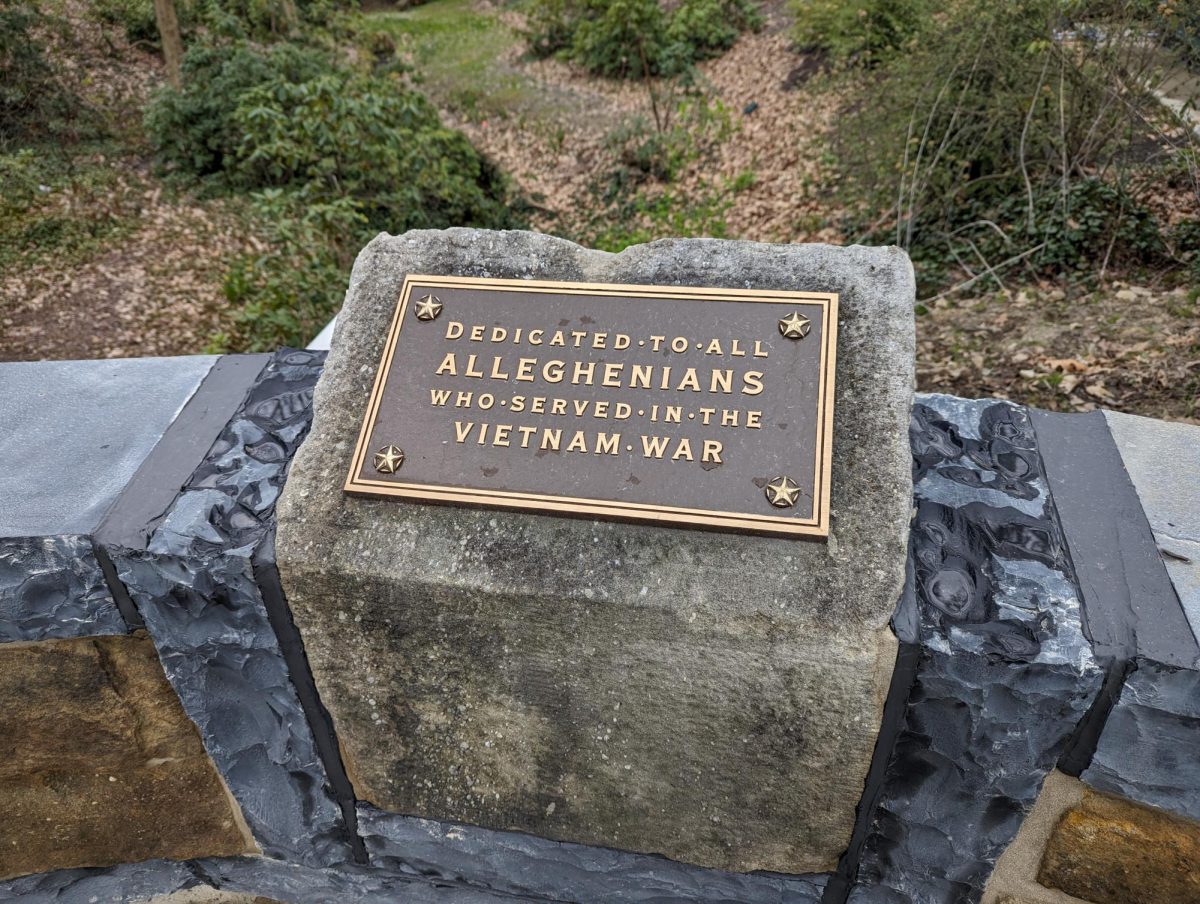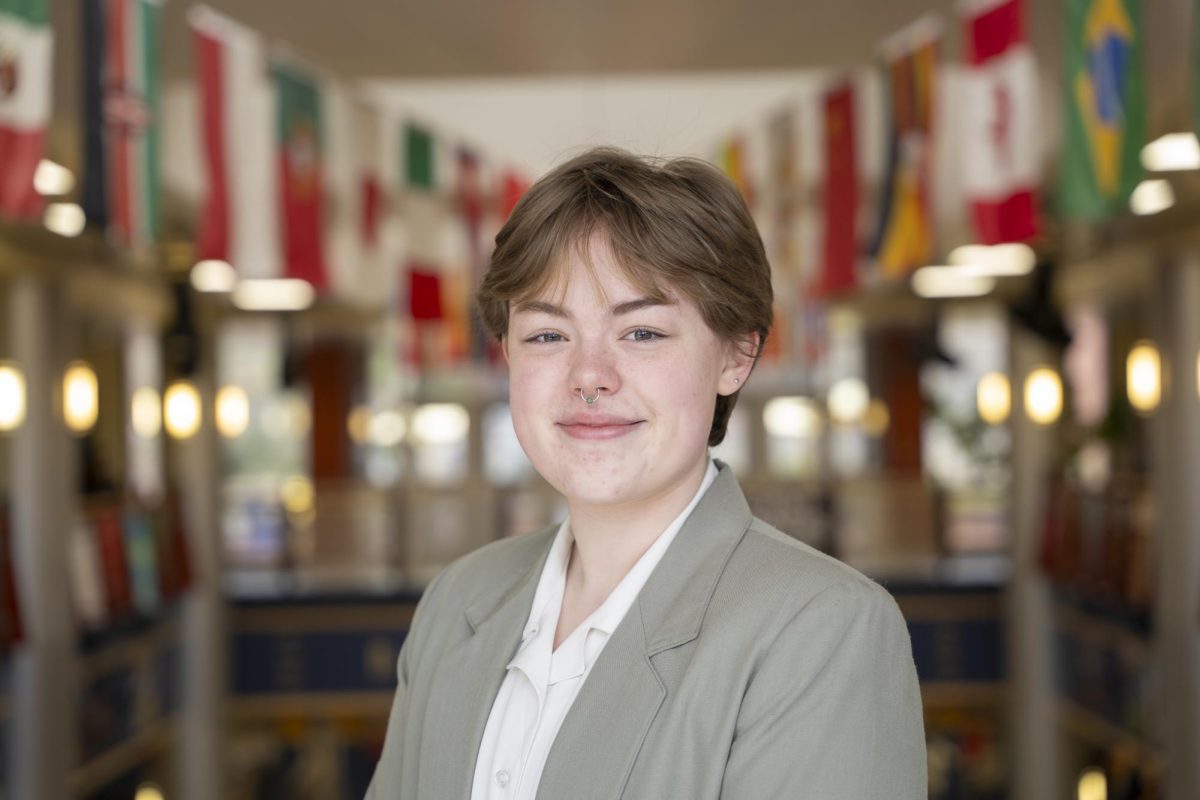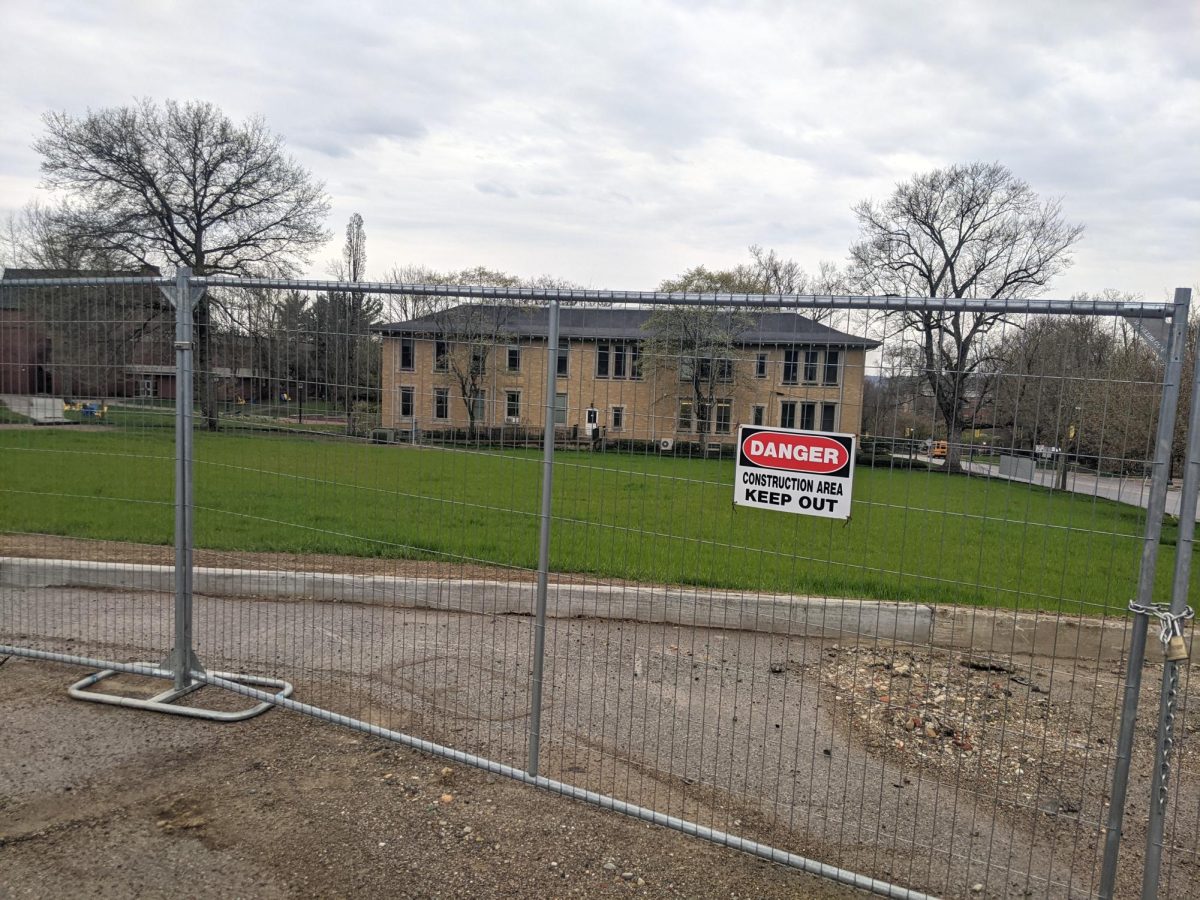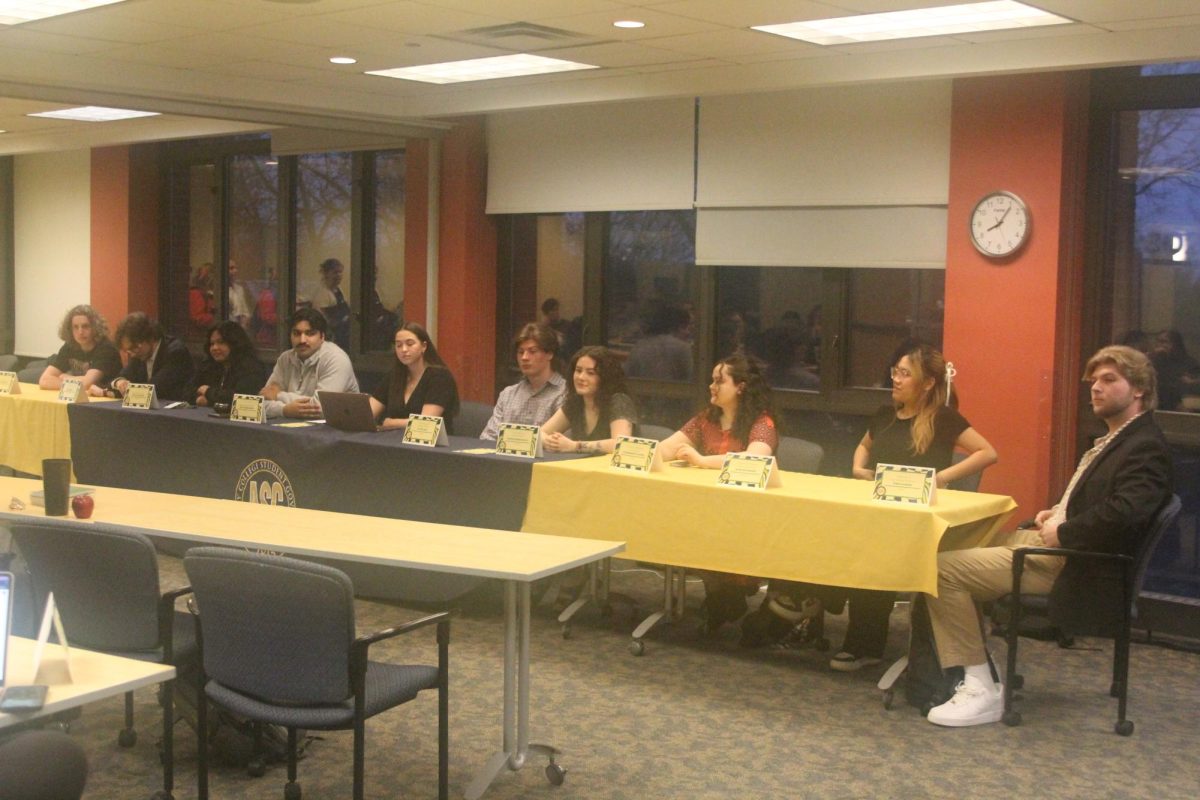By DAN BAUER

Acclaimed writer and education activist Jonathan Kozol speaks on the trials facing education in low-income communities on Oct. 17, 2012.
“Teachers are my heroes. Teaching is a beautiful profession.”
Jonathan Kozol began his speech Wednesday night moving the audience to applaud for current and future teachers, the future of education.
Kozol, an education writer, activist and former teacher, moved his audience to laughter and tears speaking in Shafer Auditorium for the Year of Transforming Education.
Drawing on personal experience as a teacher in some of New York City’s poorest schools, Kozol discussed the gaping inequalities and lingering segregation in America’s education system.
The main character in most of Kozol’s stories was a girl with the nickname Pineapple, who Kozol had been teaching since she was eight years old.
“She was a very bossy little person,” Kozol said, recalling their first meeting. “She started giving me instructions from the day we met.”
Pineapple, like many of the children Kozol features in his books, grew up in a poor neighborhood in the South Bronx.
“These kids were at the depths of destitution,” he said.
By way of explanation, Kozol described Pineapple’s apartment building, where a young boy had died trying to board an elevator. Running, he hit the call button. The doors opened and his momentum took him through. But, despite numerous complaints and requests for repair, the elevator had jammed and the car was not there. He fell to his death.
Pineapple’s school received only half the funding a wealthy New York suburban school might receive, due to the fact that school funding is calculated from local property taxes. Such settings can coarsen the souls of children, Kozol said.
“Their cafeteria was like a feeding trough for animals,” Kozol said. “I go to upper middle class schools just to remind myself what money buys for children.”
In the face of these struggles, Pineapple succeeded. Adults around her, like a local Episcopalian priest, noticed her potential and paid for her to go on to prestigious prep schools, and then on to college. She now plans to become a public school teacher like Kozol was.
But Kozol reminded the audience that such a story of triumph was not the norm.
“Pineapple was lucky,” Kozol said. “She caught the eye of people who could intervene for her… but you shouldn’t have to be a little charmer to get an education in this country. Charity is not a substitute for justice.”
He railed against those who thought that the public education system could be fixed through reforms such as the introduction of charter schools or the breaking up of overcrowded schools.
“That’s the whole agenda in America,” Kozol said. “Perfectible apartheid.”
He also called the current emphasis on standardized testing and drilling, largely a consequence of 2001’s No Child Left Behind Act, a “national hysteria.”
“You can’t give a number to something a child writes that comes straight from the heart,” Kozol said. “The poet in the child’s soul will never be rewarded by a standardized exam.”
Kozol recommended that the federal government rescind such standards and instead pour much more money into the public education system, which he referred to several times as a form of apartheid.
Kozol ended on a positive note, however, discussing a day he spent with the late Fred Rogers of Mister Rogers’ Neighborhood.
After a speech they gave together in New York, Rogers asked if Kozol could introduce him to some of the children he had written about.
The pair took the subway to what Kozol called “the most dangerous street for drugs in New York,” where dealers were whispering the brand names of heroin to them as they stepped out of the station.
A sanitation truck screeched to a halt and the driver descended and approached Kozol and Rogers. And he hugged Rogers, lifting him off of the ground. The pair proceeded to the school, where Kozol said the teachers were nearly moved to tears at Rogers’ surprise visit to their first grade classrooms.
After that, they went to the basement of an Episcopalian church, where an after-school program was to be held with some children Kozol had taught.
The kids began to pack in. The first child who spotted Rogers was named Angelo.
“If a 7-year-old doesn’t like you, they make it obvious,” Kozol said. “But if they like you, then you’re in for it.”
Angelo ran to Rogers, his arms outstretched. Jumping up, he embraced Rogers’ head and planted a kiss on his cheek.
“Welcome to my neighborhood, Mr. Rogers,” Angelo said.
Professor Aimee Knupsky, who proposed the Year of Transforming Education with Professor Stephanie Martin, said that the theme came at a “critical juncture” in American history.
“We’re at a breaking point in terms of public education,” said Knupsky, who teaches cognitive psychology. “We wanted to start a conversation about that. In higher education, the issue is that the costs has become so astronomical. How can we get a college education to all students in a way that doesn’t set them back? At K-12, it’s about starting kids off on the same foot.”
Kozol’s speech was a rollercoaster for many audience members, moving through tragedy, humor and hope.
“I cried three times,” said Katie Beck, ‘14, a student ambassador for the Year of Transforming Education. “He moved me.”
Beck herself is an educator. She teaches a low-cost acting class at the Meadville Council on the Arts. Her students are between the ages of seven and thirteen, attending the class after school.
“It goes beyond acting,” said Beck. “We check in on each other. It’s about being able to communicate.”
Beck still hasn’t decided what she wants to do after graduation, and Kozol’s speech only intensified this uncertainty.
“It’s a good thing,” said Beck. “He’s making me reconsider what I want to do. I want to do theater, I want to write, I want to go into education… I might want to do teaching. I’m not sure. I’m feeling it right now.”
Dan Winston, a 2010 Allegheny alumnus and teacher at the Creating Landscapes Learning Center, said that his school was applying alternative models to education with great success.
“Instead of teaching to the test and drilling, we infuse it with the arts,” Winston said. “We do it through inquiry-based and student-driven learning… and most of the time we achieve far greater effects as far as students finding their passion for learning.”
Winston, much like Pineapple, had found his success partially through the intervention of others. In 2000, he performed in a version of The Who’s Tommy. Jan Hyatt, former head of Allegheny’s Dance and Movement Studies department and the founder of Creating Landscapes, noticed him and gave him a full scholarship to the school’s summer program.
“I completely fell in love with the whole philosophy, the whole way of doing things,” Winston said. “It showed me what education could be and instilled in me the passion for learning and passing on to others that made me want to be a teacher.”
Student ambassador Larry Hailsham, ‘15, spent perhaps the most time with Kozol one-on-one out of any student, driving the writer from Pittsburgh to Meadville for his speech.
“I think it was really inspiring just kind of being able to sit in the car and experience somebody of that stature by yourself,” Hailsham said, likening the experience to the time he had the chance to speak privately with Michelle Obama. “The filter’s off. It’s whatever he’s feeling, it’s whatever he wants to say. And it’s the same as what he said on stage.”
Hailsham mentors youth through the Crawford County Juvenile Probation Services Office.
“I consider myself a mentor first,” Hailsham said. “Whatever they need of me. If it’s a big brother, if it’s somebody to help them do their homework, then that’s what I do.”
Hailsham hopes to go into education and then on into education policy.
“Ironically, what Mr. Kozol said not to do is exactly what I planned on doing,” Hailsham said, referring to his plans to participate in Teach for America for a short while before going on into policy. “But I think that it’s okay that he doesn’t agree with that. “That’s what I want to do. That’s truly how you make change.”
Hailsham also criticized sharply the current focus on testing due to No Child Left Behind.
“We’re talking about grooming people to get into the economy, but we’re not grooming citizens,” said Hailsham. “We need to get into the art of producing citizens, not producing the next Apple executive but producing the next Jonathan Kozol, the next Martin Luther King. Actually producing citizens who are doing something to benefit the poor, not just the poor black, not just the poor white, but the poor and everybody else. Because that’s what life is about.”
The Year of Transforming Education continues on Oct. 30 with a talk by 1993 alumnus Andre Perry entitled “The High Stakes of National Education Policy.”







Gracie • Oct 20, 2012 at 8:36 am
Great article! I like how the writer moves from Mr. Kozol’s speech to what’s being done by members of the Allegheny community in the field of education. Maybe the next Jonathan Kozol is here on our campus.
My favorite quote from Mr. Kozol’s talk: “How many of you in the audience are teachers? I always feel safer when there are teachers in the room.”